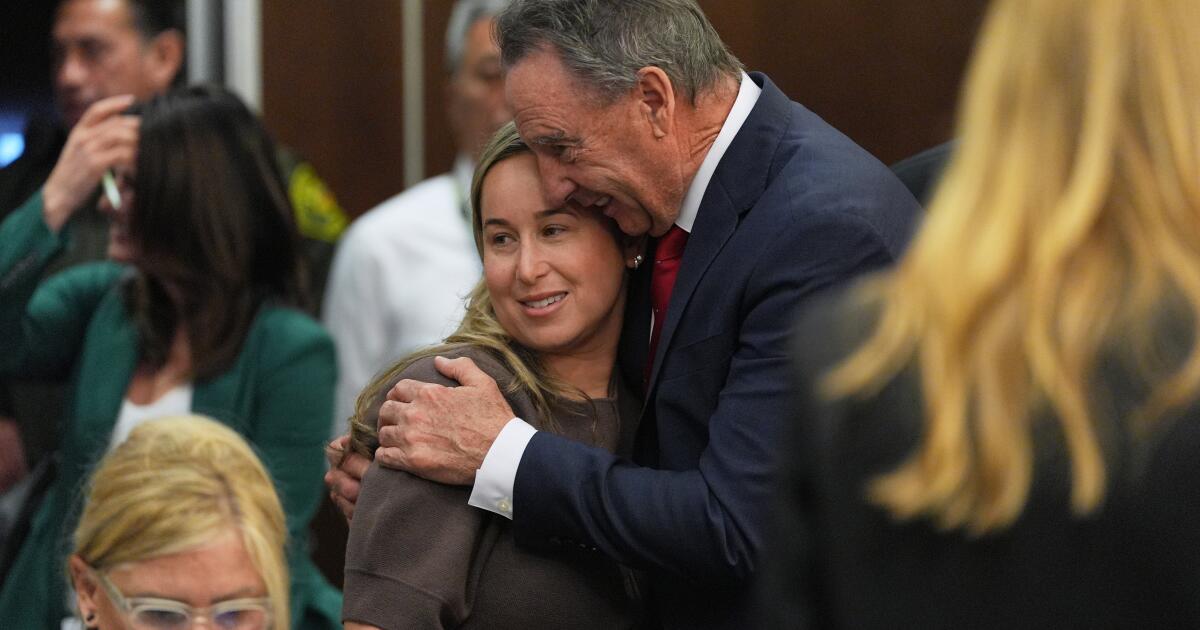Eric Kay’s wife says she told his co-workers he had drug problem
The ex-wife of the Angels employee who gave pitcher Tyler Skaggs fentanyl-laced opioid pills was steadfast in her testimony Monday and Tuesday that Angels executives knew of her then-husband’s opioid abuse for several years before Skaggs died after chopping up and snorting the pills in 2019.
The testimony of Camela Kay directly contradicted that of the Angels then-vice president of communications, Tim Mead, and traveling secretary Tom Taylor, both of whom testified during the first week of a trial in Orange County Superior Court that is expected to last until December.
Skaggs’ widow, Carli, and his parents, Debbie Hetman and Darrell Skaggs, are the plaintiffs in the lawsuit against the Angels and are seeking $118 million in lost earnings, unspecified damages for pain and suffering plus punitive damages.
Camela Kay’s testimony fortified the Skaggs family’s contention that the Angels knew that Eric Kay — the team’s communications director of 23 years who is now serving a 22-year prison term for his role in Skaggs’ death — had serious drug problems and that his supervisors and co-workers did not follow team and Major League Baseball policies in dealing with the issues.
Leah Graham, another in the Skaggs family’s deep roster of accomplished attorneys, questioned Camela Kay, taking her through a timeline beginning in 2013 when she first recognized that her husband had a drug problem.
During an Angels road trip to New York to play the Yankees, Eric admitted to her, “I take five Vicodin a day,” Camela testified. She said he made the admission in front of Mead and Taylor, whom she described as shocked, and they told her they “were going to do whatever they could to help him.”
She continued to suspect illicit drug use, however, and the issues came to the forefront in 2017, when the Kay family staged in intervention at their home on Oct. 1, the day after the Angels’ season ended.
Camela testified about a phone call that day in which she said she told Taylor that Eric’s sister, Kelly Miller, had notified her that Eric was distributing pills to Skaggs. Camela said of Taylor’s reaction, “He blows me off.”
The next day, Mead and Taylor visited the Kay home to try to convince Eric to go to rehab for “opioid addiction,” according to Camela. He said Eric told Mead to go into his bedroom and find pills he had stashed there. Mead returned with a handful of baggies containing pills.
“I was standing afar, and Tom was on the couch with Eric, and all of a sudden I see Tim walk out of our bedroom with baggies of pills,” Camela Kay said.
She said Mead placed the pills on the coffee table in front of the couch where Eric Kay and Taylor were sitting. She testified that she believed her then-husband — their divorce was finalized in 2023 — was selling the baggies of opioids to players to make extra money because the family had financial difficulties.
Both Mead and Taylor denied in their testimony that they had any recollection of finding or seeing any baggies full of pills. Mead said he recalled “very little of that morning” and did not remember going into Eric Kay’s bedroom or finding pills there.
Camela Kay testified that she witnessed team employees and players handing out opioid pills on a team flight. On cross-examination, Angels lawyer Todd Theodora asked her how many team flights she had been on, and Camela answered 10 to 12.
Theodora also pointed out discrepancies in her testimony compared to what she said in her deposition several months ago. He also pointed out that in nearly 200 texts and emails to Angels personnel, she never warned them that her husband might be taking or distributing opioids.
Camela said she had strong suspicions throughout the 2018 season that Eric was still using because he displayed erratic behavior and noted that she shared those concerns with Taylor, whose office at Angel Stadium was adjacent to her husband’s.
The Angels have attempted to establish that Eric Kay was diagnosed with bipolar disorder, although Camela disputed that. When Theodora pressed her on her assertion that she had never heard her husband was bipolar, she replied, “He had a drug addiction.”
Camela testified that Eric told her that he was taking opioids to mask mental health issues that included depression, but that he was not taking prescribed medication for bipolar disorder.
A crisis occurred Easter Sunday — April 21, 2019 — when Eric was acting erratically at work and was hospitalized that evening after Taylor had driven him home. While taking Eric’s items from Taylor’s car, Camela said, she found an Advil bottle filled with blue pills next to the car and dumped them on the passenger seat to show Taylor.
Taylor testified that he while he did recall Eric acting erratically and driving him home, he didn’t recall the blue pills in the Advil bottle.
Although Camela said she was forceful in telling Mead and Taylor that Eric needed detox and inpatient care, instead he went through an outpatient rehab program in late April and May. He returned to work — by this time moving up to the position Mead had held before he departed that spring to become president of the Baseball Hall of Fame and Museum in Cooperstown, N.Y. — and about a month later was assigned to go on the trip to Texas that resulted in Skaggs’ death.
Angels communications employee Grace McNamee testified last week that when she learned Eric Kay was going on the trip, she asked colleague Adam Chodzko, “Is this a good idea?”
“Maybe I was talking out loud, the mother in me, it just felt like maybe Eric should spend some time at home after being on leave for, you know, bipolar and mental illness,” McNamee testified.
Testimony last week from Angels human resources executive Mayra Castro established that Eric Kay wasn’t fired, but instead was allowed to resign Nov. 2, 2019. Graham said this bolstered the Skaggs family’s contention that the Angels repeatedly gave Kay special treatment rather than treating his behavior the way they would with other employees.
Castro told Graham that a 63-year-old longtime Angels custodial worker was fired for drinking a hard seltzer during a break. The employee was not visibly intoxicated and told HR she was unaware the drink contained alcohol, Castro testified. The Skaggs family’s lawyers suggested that had Kay been punished similarly, Tyler Skaggs would still be alive.
Castro also admitted to deleting and then restoring an August 2019 text she sent to a co-worker that said of Kay, “Dude he gave me tweaker vibes.” The co-worker responded: “Omfg, I always thought he definitely looked like a tweaker and sketch.” Castro testified that she realized deleting the text was wrong and turned it over to the Skaggs family‘s legal team as part of discovery.

